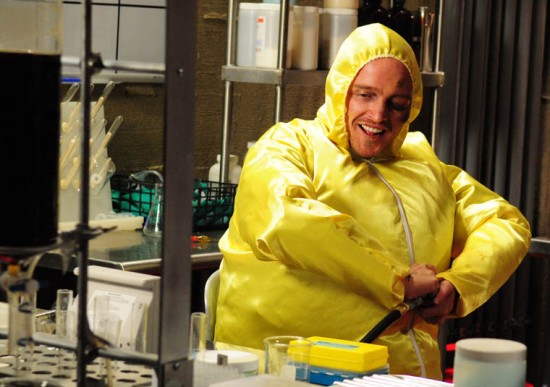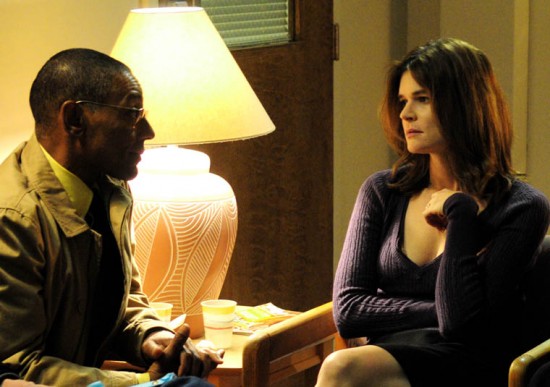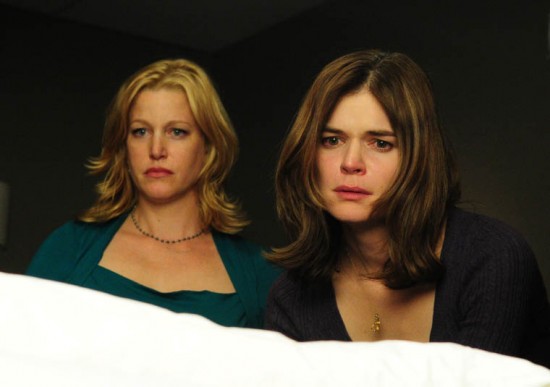Breaking Bad Recap: Episode 8 "I See You" Sharpens The Public Facade Of Walter White Inside A Hospital
/Film will be recapping and discussing each episode of the third season of Breaking Bad. A spoiler warning applies after the jump for the recaps and for the comments section. Meth heads welcome. For previous recaps, click here.
In movies, when bank robbers and gangsters grumble, "I'm never going back to jail, they'll have to kill me," the statement does not uniformly rule out visiting peers who are incarcerated. On the other side of the glass, a visit can be a sobering reminder against surrender, and a satisfying reassurance of dominance to the criminal mind—"Better him than me"—all the while keeping the enemy close. Walter White has never served a prison sentence, but he's weathered a death sentence as a patient confined to a hospital. The time served there, the loss of freedom and control over his life, forever skewed his outlook on mortality and morality. The hospital is a sort of prison in Walter's psyche, and in season three, he seems to gain an introspective satisfaction in visiting others there—standing over their beds, his hand—or in the enemy's case his eyes—on theirs.
Episode seven, and especially episode eight, entitled "I See You" (a play on the acronym for "intensive care unit") demonstrate how smoothly Walt operates in this setting when he's not the patient. "I hide in plain site, same as you," Gus Fring tells him. And in this episode, Walt is never far from a character who is bruised, bloodied, unconscious, emotionally scarred or confused, characters snagged directly or indirectly in the wrath of Walt's crimes, and thus weaker than him. The hospital scenes in "I See You" are an affirmation for Walt of a reality in which he's the patriarch of survival, his facade the armor.
 ER Surprises and Lab Politics
ER Surprises and Lab Politics
Blessed with four bullet holes courtesy the Cousins, an unconscious Hank is rushed by ambulance and stretcher into the ER—much to Jesse's surprise. Toss a "bitch!" on top. Pinkman is enjoying a cigarette outside the hospital when it happens, having been discharged only minutes ago. One side of his face is still grotesquely swollen from Hank's beating. Jesse looks like a Garbage Pail Kid dressed as Rob Dyrdek for Halloween. When he's through basking in Hank's misfortune—things are looking up, yo!—he enters Walt's lab on Cloud 9 to begin their reinstated multi-million dollar partnership.
Problem is, the timing is wretched. Walt is in the process of firing Gale—comparing their incompatible work routines to "classical" versus "jazz"—when Pinkman bursts in. Escorted by a super-pissed but characteristically composed Victor, Gale is equally nonplussed by Jesse's amateur behavior and plum-colored bruises. In keeping with Walt's shitty analogy, if Gale is Ornette Coleman (or, more accurately, Kenny G), Jesse is like a wannabe Ol' Dirty Bastard, shouting his approval of the lab's "shiny" aesthetic with gangsta posture; later, with the lab to himself, Jesse inflates his yellow lab suit to Missy Elliot video-esque proportions, a reggae remix of "Shimmy Shimmy Ya" blaring on the soundtrack. These are very silly antics—borderline caricature for a main character—but Jesse is lost in a spiral of relief, depression, loneliness, and physical pain, if not the side effects of pain meds. Having your ass kicked severely, being offered a million bucks, and discovering an underground lair would make anyone loony.
Sidenote: I'm still not sure why Walt chooses to terminate Gale outright—and so rudely—-rather than choosing to pull Jesse into the fold, thus increasing productivity and profits. Compromise is never entertained. In "I See You," we learn Gale actually designed the lab, and logic says this would necessitate a huge severance payment from Gus. Moreover, what advantage does Walt possess recipe-wise since the two have worked together on long shifts? Could Gale not recreate or improve upon Walt's recipe? As it stands, Gale joins Donald (Jane's father) in the realm of vengeful threats that Walt continues to underestimate (or fails to estimate, period). Gus Walks Through Walls, Says Adios to the Cartel and the Cousins of Death
Gus Walks Through Walls, Says Adios to the Cartel and the Cousins of Death
If you were asked to list the weaknesses of Gus, could you cite any?
Walt reaches two prolonged realizations related to Gus in this ep: the Cousins were the ones mentioned by Tuco before Hank killed him and were probably seeking out Walt instead of Hank (did Gus know?); for sometime, Gus was aware that Hank was his brother-in-law; moreover, Gus has chatted with Hank inside the DEA's offices and has a reputation within the agency as a community pillar—nicely illustrated here when he donates chicken to all of the cops and Hank's family at the hospital.
Walt clearly aspires to reach Gus's utmost level of cold calculation, but nevertheless has a hard time stomaching his tendency to rub in the effortless public transparency. It reeks of evil. In front of Walt in the hospital waiting room, Gus warmly receives praise and admiration from Skyler and Walt Jr. (he's offering a $10,000 reward). But then Gus goes the step further, telling Marie...
"Men like your husband are the thin blue line between us and these animals."
"I talked to your husband for a few minutes. As a matter of fact, Mr. White, your name came up. It was clear to me how deeply he cares for you."
It's unclear how deeply Walt has started to consider the complicity of Gus in the hit on Hank. If and when he confronts Gus on this topic, how do you expect it to play out? Setting up precedent for Gus's reaction to threats: When the cartel boss, Juan Bolsa, accuses him of bypassing the cartel's authority and ordering the Cousins' hit on Hank, we quickly, almost comically, see who is the more powerful kingpin. At home in Mexico, Bolsa is murdered while on the phone by an ambush of machine gun fire. Gus is on the other end, standing in his restaurants' empty parking lot, unshaken by the sound of screams and bloodshed.
For a major dismantling and reshuffling of hierarchy—the cartel were lamely more talk than walk this season, and the Cousins barely talked—this entire power struggle was reduced to a tidy minute or two of screen time. At season's start, the Cousins and Bolsa were presented as worthy adversaries capable of untold "dramatic" carnage. No more. The only one left is Tio, a moot character due to his age and physical state. Gus is free to monopolize, for now the biggest fish in the meth sea.
 A Congregation of DEA, Drug Dealers, a Hit Man, and Sad Women
A Congregation of DEA, Drug Dealers, a Hit Man, and Sad Women
In the hospital cafeteria, Marie channels her anxieties and fragile mind into a bitch session directed at water stains on a fork. Earlier in the hospital waiting room, Walt's OCD resulted in him fixing a wobbly leg on a chair (by sliding a folded magazine insert under it)—in the cafeteria he can't resist testing out a little psychological handy work on Marie. Walt relates to her sadness with a confession: back when he was being driven to the hospital by Skyler and Walt Jr., his lifespan up in the air, he "never wanted to be stuck in traffic so bad in my life" and fretted a procession of green lights. Green lights meant less family time, if only seconds less. Similar to his rant in the high school gymnasium earlier this season, Walt is long-winded here, but he brings his point full circle to Marie: "I'm not half the man your husband is."
Does Skyler tear up at Walt's words here...or his lies? If she's contemplating the dark side, or on the flipside, disgusted by the likelihood that Hank was shot due to Walt, the episode didn't adequately convey either mindset. Following the climaxing violence and tension in episodes six and seven, Walt's role in "I See You" at times recalled the saying, "the best way to hide in the forest is to be a tree." He floats through close encounters with family, DEA, Steven, Gus, the surviving Cousin, and phone chats with Jesse—the hospital, once his doom, now his domain.
Question: How did Mike slip into Leonel's hospital room to kill him? Before this happens, the room was shown heavily guarded by cops following Leonel's memorable, bloody stumped charge at Walt and Steven. And should Steven's reaction to Leonel's sudden death–a smile and a good riddance—have been more serious and suspicious, since the Cousin was shown in stable condition and hypothetically could have offered vital info on Hank's hit?Parallel to Pablo Escobar: At the hospital, Walt. Jr shows his dad a copy of Killing Pablo, the bestselling (and quite awesome) account of the hunt for Colombian cocaine kingpin Pablo Escobar by Mark Bowden (Black Hawk Down). The book was a gift and recommendation from Hank. It's worth noting that Escobar didn't draw the unbridled ire of American authorities until he ordered the bombing of an airliner (subtle shades of the season two finale).Breaking Bad airs Sundays at 10 p.m. EST on AMC. For previous /Film episode recaps, click here.Hunter Stephenson can be reached at h.attila/gmail and followed on Twitter.
